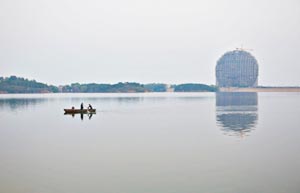

Amid growing demand for natural gas, China's top economic planner has called for an increase in imports and stronger cooperation with Central Asian countries to ensure a stable supply in the coming winter.
The National Development and Reform Commission said on its website on Monday that China will further hold talks with Central Asian countries which significant natural gas resources to increase pipeline gas imports in the winter, when an energy shortage usually hits the country.
Meanwhile, the top-three domestic oil and gas companies are also being urged to accelerate the pace of construction of their natural gas infrastructure projects, including pipelines and liquefied natural gas receiving terminals, to boost supply.
China National Offshore Oil Corp - the largest offshore oil explorer and LNG importer - should accelerate its LNG projects in Zhuhai, Guangdong province, and in Tianjin municipality, said the NDRC.
"CNOOC should strengthen its cooperation with other companies to increase natural gas supply for the West-to-East pipeline and the Shannxi-to-Beijing pipeline in addition to meeting the current demand," said the NDRC in the statement.
China's West-to-East natural gas pipeline is owned by China National Petroleum Corp, the country's largest oil and gas producer.
The commission also asked CNPC to increase pipeline gas supply by making full use of its LNG receiving terminals in Rudong, Jiangsu province, and in Dalian, Liaoning province.
As China's industrialization and urbanization drive accelerates and the country raises its standards for environmental protection and carbon reduction, natural gas consumption has been rising quickly in recent years.
However, due to the outdated infrastructure and inadequate natural gas storage capacity, it has become a harsh task to ensure natural gas supply in the winter.
And due to the government's recent strict policy to deal with air pollution, the demand for the clean energy, such as natural gas, has been soaring in many provinces.
The NDRC expects China to face an even more severe natural gas shortage in the coming winter and next spring compared with previous years.
 A day in the life of a car model
A day in the life of a car model
 Vintage cars gather in downtown Beijing
Vintage cars gather in downtown Beijing
 Asia Bike Trade Show kicks off in Nanjing
Asia Bike Trade Show kicks off in Nanjing
 Student makes race car for 4th Formula SAE of China
Student makes race car for 4th Formula SAE of China
 Beijing suburb to hold 2014 APEC meeting
Beijing suburb to hold 2014 APEC meeting
 Belgian, British scientists share 2013 Nobel Prize in Physics
Belgian, British scientists share 2013 Nobel Prize in Physics
 Model with modified BMW X6 M SUV
Model with modified BMW X6 M SUV
 'Golden Week': No pain, no gain
'Golden Week': No pain, no gain